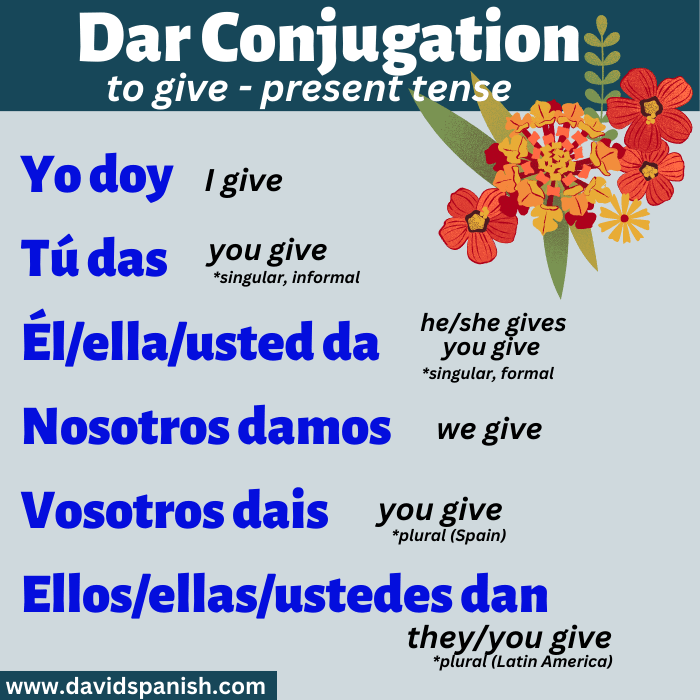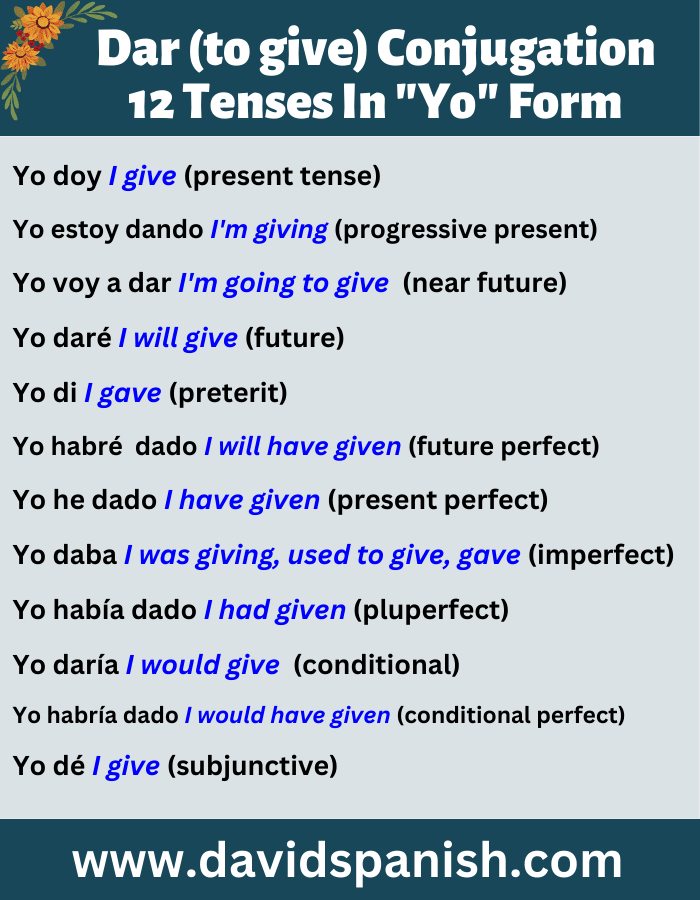Dar in means “to give” in Spanish and is an essential verb for all students. The conjugation of dar in the present tense is: Yo doy (I give), tú das (you give), él/ella/usted da (he/she gives; you give), nosotros damos (we give), vosotros dais (you give) and ellos/ellas/ustedes dan (they/you give).

Dar is an irregular AR verb. This is because its ending in the first-person singular (yo) form when conjugated in the present tense is different from all other regular AR verbs. This page on our site covers regular and irregular Spanish AR verbs in detail.

Further down the page we provide detailed conjugation charts for dar with example sentences in the following ten commonly used verb tenses:
- Present tense (presente de indicativo)
- Progressive present (presente progresivo)
- Near future (futuro inmediato)
- Future tense (futuro)
- Preterite (pretérito)
- Present perfect indicative (perfecto de indicativo)
- Imperfect (imperfecto de indicativo)
- Conditional (potential simple)
- Present subjunctive (presente de subjuntivo)
- Imperative (imperativo)
Dar conjugation table

The following graphic shows the conjugations for dar in the first-person singular (yo) form in twelve verb tenses.

Dar conjugation charts
Present tense (presente de indicativo)
| yo doy | I give | Doy las llaves a mi amigo. | I give the keys to my friend. |
| tú das | you give | Tú das el regalo a tu hijo. | You give the present to your son. |
| él/ella, usted da | he/she gives, you give | Ella da una respuesta a su marido. | She gives a reply to her husband. |
| nosotros damos | we give | Damos la pizza a los niños. | We give the pizza to the kids. |
| vosotros dais | you give | Dais el coche a vuestros amigos. | You give the car to your friends. |
| ellos/ellas, ustedes dan | they/you give | Dan las bicicletas a los turistas. | The give the bicycles to the tourists. |
Progressive present (presente progresivo)
The progressive present tense formed by combining the present tense of estar (to be) with the present participle. Yo estoy dando translates to “I am giving”.
| yo estoy dando | I am giving | Estoy dando los cuadernos a los estudiantes. | I'm giving the notebooks to the students. |
| tú estás dando | you are giving | ¿Me estás dando la motocicleta? | Are you giving me the motorbike? |
| él/ella, usted está dando | he/she is giving, you are giving | Está dando el bocadillo al empleo. | He's giving the sandwich to the worker. |
| nosotros estamos dando | we are giving | ¡No estamos dando nada a nadie! | We aren't giving anything to anybody! |
| vosotros estáis dando | you are giving | ¿Nos estáis dando las respuestas? | Are you giving us the answers? |
| ellos/ellas, ustedes están dando | they/you are giving | Están dando las instrucciónes a los voluntarios. | They're giving the instructions to the volunteers. |
Near future (futuro inmediato)
The near future tense is formed by combining the present tense of ir (to) with the preposition a and an infinitive. Yo voy a dar translates to “I am going to give”.
| yo voy a dar | I am going to give | Voy a dar el postre a los invitados. | I'm going to give the deserts to the guests. |
| tú vas a dar | you are going to give | ¿Me vas a dar la llaves? | Are you going to give us the keys? |
| él/ella, usted va a dar | he/she/you is (are) going to give | Te va a dar el coche. | He's going to give you the car. |
| nosotros vamos a dar | we are going to give | Vamos a dar los juguete a los niños. | We're going to the give the toys to the kids. |
| vosotros vais a dar | you are going to give | Vais a dar la paella a los huéspedes. | You're going to thve the paella to the guests. |
| ellos/ellas, ustedes van a dar | they/you are going to give | Van a darnos sus bendiciónes. | They're going to give us their blessings. |
Future tense (futuro)
In the future tense, yo daré translates to “I will give”.
| yo daré | I will give | Te daré mi respuesta mañana. | I'll give you my answer tomorrow. |
| tú darás | you will give | ¿Cuándo me darás el libro? | When you will give me the book? |
| él/ella, usted dará | he/she/you will give | Nos dará el coche mañana. | He'll give us the car tomorrow. |
| nosotros daremos | we will give | Daremos el chocolate a los ninos más tarde. | We'll give the chocolate to the kids later. |
| vosotros daréis | you will give | Daréis consejos a los recién llegados. | You'll give advice to the newcomers. |
| ellos/ellas, ustdes darán | they/you will give | ¿Cuándo darán los juguetes a los niños? | When will they give the toys to the kids? |
Preterite (pretérito)
The preterite is a commonly used Spanish past tense used to describe actions which occurred at a defined time. Yo di translates to “I gave”.
| yo di | I gave | Ya di los caramelos a los niños. | I already gave the candy to the kids. |
| tú diste | you gave | ¿Por qué me diste los cigarros? | Whey did you give the me cigarettes? |
| él/ella, usted dio | he/she/you gave | Mamá ya dio la pizza su hija. | Mom already gave the pizza to her daughter. |
| nosotros dimos | we gave | No dimos las invitaciónes a los invitados. | We didn't give the invitations to the guests. |
| vosotros disteis | you gave | ¿Disteis la tarea a los estudiantes? | Did you give the homework to the students? |
| ellos/ellas, ustedes dieron | they/you gave | Dieron los instrumentos a los músicos. | They gave the instruments to the musicians. |
Present perfect indicative (perfecto de indicativo)
The present perfect indicative tense is used to describe past actions which have a bearing on the present. The tense is formed by combing the present tense of haber (to have) with the present participle. Yo he dado translates to “I have given”.
| yo he dado | I have given | He dado las herramientas al mecánico. | I've given the tools to the mechanic. |
| tú has dado | you have given | ¿Me has dado tu número telefónico? | Have you given me your telephone number? |
| él/ella, usted ha dado | he/she/you have (has) given | Todavía no ha dado el helado a los chamacos. | He still hasn't given the ice cream to the kids. |
| nosotros hemos dado | we have given | Hemos dado todos los lápizes a los estudiantes. | We've given all the pencils to the students. |
| vosotros habéis dado | you have given | ¿Por qué no habéis dado el televisor a vuestro hijo? | Why haven't you given the TV set to your son? |
| ellos/ellas, ustedes han dado | they have given | No han dado nada a los voluntarios. | They haven't given anything to the volunteers? |
Imperfect (imperfecto de indicativo)
The imperfect tenses is used to describe past actions which occurred at unspecified times. Yo daba translates to “I used to give”, “I was giving” and “I gave”.
| yo daba | I was giving (or used to give, gave) | Cuando era joven daba consejos a todo el mundo. | When I was young I used to give advice to everybody. |
| tú dabas | you were giving | ¿Qué dabas a los ninos? | What did you used to give to the kids? |
| él/ella, usted daba | he/she/you were (was) giving | Ella daba los juguete a los niños cuando papá llegó. | She was giving toys to the kids when dad arrived. |
| nosotros dábamos | we were giving | Dábamos comida a los indigentes todas las semanas. | We used to give food to the homeless every week. |
| vosotros dabais | you were giving | ¿Qué dabais a los touristas? | What did you used to give to the tourists? |
| ellos/ellas, ustedes daban | you/they were giving | Los maestros daban mucha tarea a los estudiantes. | The teachers used to give a lot of homework to the students. |
Conditional (potential simple)
The conditional tense is used to express hypothetical situations. Yo daría translates to “I would give”.
| yo daría | I would give | Te daría más tiempo si fuera posible. | I'd give you more time if it were possible. |
| tú darías | you would give | ¿Qué darías a tu hermano si tuvieras más dinero? | What would you give to your brother if you had more money? |
| él/ella, usted daría | he/she/you would give | Él daría el coche a su esposa si no lo necesitara. | He'd give the car to his wife if he didn't need it. |
| nosotros daríamos | we would give | Daríamos dulces a los niños si fuera Halloween. | We'd give candy to the kids if it were Halloween. |
| vosotros daríais | you would give | Daríais el sobre al cartero si tuvierais un timbre. | You'd give the envelope to the postman if you had a stamp. |
| ellos/ellas, ustedes darían | they/you would give | Ellos darían un propina al mesero si el servico fuera mejor. | They'd give a tip to the waiter if the service were better. |
Present subjunctive (presente de subjuntivo)
The subjunctive mood is used to express wishes, emotions and doubts. Yo dé translates to “I give”.
| yo dé | I give | Es importante que dé dinero a las organizaciónes de beneficencia. | It's important that I give money to charity. |
| tú des | you give | Quiero que des esta letra a mi amigo. | I want you to give this letter to my friend. |
| él/ella, usted dé | he/she gives, you give | Es necesario que dé flores a su esposa. | It's necessary that he gives flowers to his wife. |
| nosotros demos | we give | Quiere que demos comida a los huéspedes. | He wants us to give food to the guests. |
| vosotros deis | you give | ¡Requerimos que nos deis una buena respuesta! | We require that you give us a good answer! |
| ellos/ellas, ustedes den | they/you give | Es dudoso que den libros a los niños. | It's doubtful that they give books to the kids. |
Imperative (imperativo)
The imperative mood is used for giving commands and making suggestions. Example sentences are below the chart.
| (tú) ¡da! | Give! | ¡no des! | Don't give! |
| (usted) ¡dé! | Give! | ¡no dé! | Don't give! |
| (nosotros) ¡demos! | Let's give! | ¡no demos! | Let's not give! |
| (vosotros) ¡dad! | Give! | ¡no deis! | Don't give! |
| (ustedes) ¡den! | Give! | ¡no den! | Don't give! |
- ¡Deme una respuesta! Give me an answer!
- ¡Dame cinco minutos! Give me five minutes!
- ¡Demos caramelos a los niños! Let’s give candy to the kids.
- ¡No des refresco a los chicos! Don’t give soda to the kids!
Discover more:
- Estar Conjugation in Spanish
- Ser Conjugation: How to Conjugate “To Be” in Spanish
- Querer Conjugation: How To Conjugate To Want In Spanish
- Venir Conjugation: How to Conjugate “To Come” In Spanish
- La Bamba Meaning, Spanish Lyrics & English Translation - May 4, 2024
- Bésame Mucho Meaning, Spanish Lyrics & English Translation - May 3, 2024
- Querida – Lyrics, Meaning & Translation - May 2, 2024
